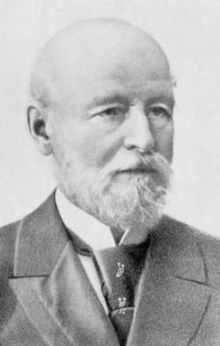Botho zu Eulenburg
Botho Wendt August Graf zu Eulenburg (born July 31, 1831 in Wicken bei Bartenstein, † November 5, 1912 in Berlin ) was Prussian Prime Minister and Minister of the Interior.
family
Botho Wendt (or Wend ) zu Eulenburg was a son of Count Botho Heinrich zu Eulenburg (1804–1879) and his wife Therese nee. Countess v. Dönhoff (1806-1885). His brother was the Prussian Minister of the Royal House and Oberhofmarschall August Graf zu Eulenburg . Prince Philipp zu Eulenburg was a second cousin. Botho Wendt zu Eulenburg married Elisabeth von Alvensleben , widowed Countess von Keyserlingk-Neustadt , in 1875 . The son Botho (* 1879) died at the age of two.
Life
Eulenburg studied 1849-1852 jurisprudence at the University of Königsberg and the Rheinische Friedrich-Wilhelms-University of Bonn . In 1851 he became active in the Corps Borussia Bonn .
After completing his studies, he became a court assessor in 1857 . In the same year he switched from the administration of justice to the internal administration of Prussia. He was entrusted with the administration of the Marienwerder district office . From 1859 he was district administrator in Deutsch-Krone . In 1864 he became a laborer and in 1867 he was a lecturer in the Prussian Ministry of the Interior. Otto von Bismarck valued him at that time as the only capable head among the younger councilors of the ministry.
He was a member of the Prussian House of Representatives from 1863 to 1870 and again from 1879 to 1881 and in 1867 was also a member of the Reichstag of the North German Confederation . He was a conservative there.
In 1869 he was appointed district president in Wiesbaden . From 1872 he was district president of Lorraine with its seat in Metz and from 1873 chief president of the province of Hanover .
Eulenburg was from 1878 to 1881 as the successor to his uncle Friedrich Graf zu Eulenburg Prussian Interior Minister and dealt in particular with the socialist law . When he tried to push ahead with the administrative reform that his predecessor had already planned, a conflict arose with Otto von Bismarck. The contradiction was sparked by the question of local government in the country. While Bismarck pleaded for the supervision by the district councils to be retained, zu Eulenburg advocated supervision by the district committee in accordance with the Prussian House of Representatives. Bismarck let it come to an open confrontation in February 1881 in the Prussian manor house . As a result, Eulenburg was forced to resign.
From 1881 to 1892 he was President of the Hesse-Nassau Province in Kassel .
From March 1892 to 1894 he was the successor of Leo von Caprivi as Prussian Prime Minister. Contrary to the usual practice before and after, the offices of Prime Minister and Chancellor were separated . The same was true only during Albrecht von Roon's prime ministerial presidency (January to November 1873). After the fall of the Prussian Interior Minister Ernst Ludwig Herrfurth as a result of the adoption of the new rural community order (Prussia) , Eulenburg also became Prussian Interior Minister in the summer of 1892.
Eulenburg agreed with Bismarck that social democracy should be fought with repressive means. He rejected the socio-political reforms of the New Course , as represented by the Prussian Trade Minister Hans Hermann von Berlepsch . In agreement with Wilhelm II , zu Eulenburg advocated the overturn bill in 1894 . If necessary, this new special law should also be enforced with the help of a coup to eliminate the reluctant Reichstag. Thus, zu Eulenburg met the resistance of Leo von Caprivi. This prevailed, supported in particular by the southern German states. Because Caprivi refused to work with zu Eulenburg, both were dismissed by Wilhelm II on October 26, 1894 and replaced by Prince Chlodwig zu Hohenlohe-Schillingsfürst .

From 1899 zu Eulenburg was a member of the Prussian manor house. In 1909 he became a member of the Immediatkommission for the administrative reform. From 1909 to 1912 he was chairman of the so-called old parliamentary group in the manor house.
Botho zu Eulenburg died in Berlin in 1912 at the age of 81. His final resting place is in the Trinity Cemetery I in Berlin-Kreuzberg . A stone grave slab with a large, raised cross and inscriptions serves as a grave marker. The tomb of his younger brother August zu Eulenburg (1838–1921) is nearby.
Individual evidence
- ↑ Kösener Corpslisten 1930, 11 , 397
- ^ Thomas Nipperdey : German history. 1866-1918. Vol. 2: Power state before democracy. CH Beck, Munich 1992, ISBN 3-406-34801-7 , p. 704.
- ^ Hans-Jürgen Mende : Lexicon of Berlin burial places . Pharus-Plan, Berlin 2018, ISBN 978-3-86514-206-1 , p. 224.
literature
- Karl Erich Born: Eulenburg, Botho to. In: New German Biography (NDB). Volume 4, Duncker & Humblot, Berlin 1959, ISBN 3-428-00185-0 , p. 680 f. ( Digitized version ).
Web links
- Botho zu Eulenburg in the database of members of the Reichstag
- Short biography of the Berlin State Library
- Eulenburg, Botho Wend August Graf to. Hessian biography. (As of February 3, 2020). In: Landesgeschichtliches Informationssystem Hessen (LAGIS).
| personal data | |
|---|---|
| SURNAME | Eulenburg, Botho too |
| ALTERNATIVE NAMES | Eulenburg, Botho Wendt to August Graf |
| BRIEF DESCRIPTION | Prussian Prime Minister and Minister of the Interior |
| DATE OF BIRTH | July 31, 1831 |
| PLACE OF BIRTH | Sweet peas near Bartenstein |
| DATE OF DEATH | November 5, 1912 |
| Place of death | Berlin |






